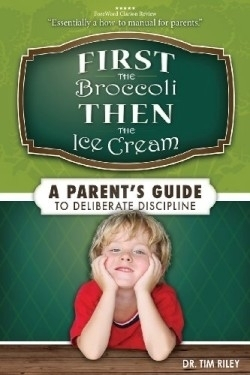First the Broccoli, Then the Ice Cream
A Parent's Guide to Deliberate Discipline
- 2010 INDIES Winner
- Honorable Mention, Parenting (Adult Nonfiction)
“Do what you are supposed to do, then you can do what you want to do.” Dr. Tim Riley’s basic principle seems very simple. However, getting children—and adults, for that matter—to abide by this rule can be very difficult, at least at first.
First the Broccoli Then the Ice Cream is essentially a how-to manual for parents to get their children to do what they are supposed to do, regardless of the situation. Riley holds a doctorate in psychology and is a psychologist and professor of pediatrics at the University of Nebraska Medical Center. His private practice focuses on families and children, and his expertise includes treating ADD/ADHD, anxiety, and other emotional and behavioral issues.
Sometimes parents have trouble altering their children’s behavior because it means they must also change their own behavior. At one of Riley’s seminars, he stressed the negative impact of a television in a child’s room and suggested that parents remove them when they get home. One parent expressed doubt that it was possible. When Riley asked why she thought it would be hard, she replied, “Because it’s his TV.” In addition, she often lay in bed watching television with him and sometimes fell asleep there.
Because removing the television would cause more work for her and probably a period of protests and anger from her son, the mom didn’t want to follow the doctor’s advice. This is the cause of many issues brought to Dr. Riley’s practice.
Parents of children with disabilities can sometimes face additional challenges. In these cases Riley has still been able to make great progress with clients. He provides one example of a young girl who is non-verbal. Her parents thought she couldn’t follow directions due to being non-verbal, which caused many difficulties for the family. To discover whether the child couldn’t follow directions, or simply wouldn’t, Riley performed a simple test:
I asked Madison to hand a wooden puzzle piece to her father. SheÂ…did nothing. So I put her in Time-Out. When I let her out and told her again to hand the puzzle piece to her father, she did it right away.
Riley also helps families set achievable tasks for their children. Some parents become frustrated when their child won’t do something, no matter the consequences, when the child actually can’t do the task.
The strategies offered in the book are simple to follow and include tips on how to modify the strategy if it isn’t working for your child. Parents, caregivers, and teachers will benefit from the behavioral strategies offered here.
Disclosure: This article is not an endorsement, but a review. The publisher of this book provided free copies of the book and paid a small fee to have their book reviewed by a professional reviewer. Foreword Reviews and Clarion Reviews make no guarantee that the publisher will receive a positive review. Foreword Magazine, Inc. is disclosing this in accordance with the Federal Trade Commission’s 16 CFR, Part 255.

